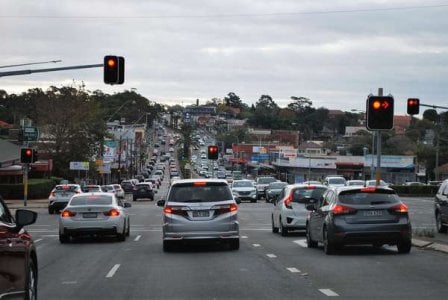Australians’ impatient road manners drive this expat crazy!
- Replies 15
Driving in a new country can be an adventure in itself, with different rules, road layouts, and driver behaviours to navigate.
And for this British expat in Australia, one aspect of driving Down Under has proven particularly jarring.
Erika White, a young Brit living on the Gold Coast, voiced her observations on Australian driving habits, specifically pointing out the urgency displayed by drivers when the traffic lights change from red to green.
According to White, if you're the first car at the lights and don't move within a couple of seconds of the light changing, you're likely to hear the honk of the horn from the car behind you.
'They have no patience here in Australia,' she remarked.
'As soon as the traffic light turns green and you take more than two seconds to go, the person behind you is beeping.'

This observation sparked a debate among Australians, with thousands reacting to White's comments.
Some defended the quick-off-the-mark approach.
‘If you’re in pole position, you have the most important job. Your reaction time determines how many others are making it through that cycle,’ one commented, with many others agreeing.
‘Why are you taking two seconds… that means probably two cars at the back of the queue need to wait for another change of lights,’ another added.
Others empathised with the expat, arguing that speeding through as soon as the light changes is not safe.
‘I think it is safer when delayed a bit—you know how many stupid drivers speed through a red light,’ one explained.
‘When I was in Melbourne, the millisecond it turns green, people are beeping. It’s so unnecessary,’ another agreed.
‘Even when the light is green, if you’re first, you should always check for red light runners, then go,’ a third chimed.
The discussion highlighted a cultural difference in traffic light systems.
In the United Kingdom, an amber light precedes the green, signalling drivers to prepare to move.
In contrast, Australian lights switch directly from red to green.
This difference might have contributed to the expectation of immediate movement in Australia, as there's no 'prepare to go' signal.
Moreover, there seems to be some confusion among Australian drivers regarding the amber light.
While it's commonly misunderstood that driving through an amber light is permissible as long as it doesn't turn red, the reality is that in most Australian states, it's an offence to enter an intersection on an amber light unless it's unsafe to stop as highlighted by an incident last year involving a woman and a $500 fine.
This misunderstanding can lead to drivers speeding up to beat the red light, further reinforcing the need for caution when the light turns green.
You can watch Erika’s full video here:
Each Australian state has its own road rules, but the national guidelines are clear about the amber light rule.
Fines and demerit points can be issued for those who try to beat the amber light, a fact that some Australians admit they were unaware of.
Previously, another expat, from the United States this time, also shared several traffic rules that confused her when she moved to Australia.
 Have you noticed a difference in driving habits between Australia and other countries you've visited or lived in? Do you think Australian drivers are too impatient at traffic lights, or is it a necessary part of keeping traffic flowing?
Have you noticed a difference in driving habits between Australia and other countries you've visited or lived in? Do you think Australian drivers are too impatient at traffic lights, or is it a necessary part of keeping traffic flowing?
Share your experiences and thoughts in the comments below.
And for this British expat in Australia, one aspect of driving Down Under has proven particularly jarring.
Erika White, a young Brit living on the Gold Coast, voiced her observations on Australian driving habits, specifically pointing out the urgency displayed by drivers when the traffic lights change from red to green.
According to White, if you're the first car at the lights and don't move within a couple of seconds of the light changing, you're likely to hear the honk of the horn from the car behind you.
'They have no patience here in Australia,' she remarked.
'As soon as the traffic light turns green and you take more than two seconds to go, the person behind you is beeping.'

Erika White, a British expat, shared her frustration with impatient Aussie drivers beeping as soon as the traffic light turns green. Credits: Shutterstock
This observation sparked a debate among Australians, with thousands reacting to White's comments.
Some defended the quick-off-the-mark approach.
‘If you’re in pole position, you have the most important job. Your reaction time determines how many others are making it through that cycle,’ one commented, with many others agreeing.
‘Why are you taking two seconds… that means probably two cars at the back of the queue need to wait for another change of lights,’ another added.
Others empathised with the expat, arguing that speeding through as soon as the light changes is not safe.
‘I think it is safer when delayed a bit—you know how many stupid drivers speed through a red light,’ one explained.
‘When I was in Melbourne, the millisecond it turns green, people are beeping. It’s so unnecessary,’ another agreed.
‘Even when the light is green, if you’re first, you should always check for red light runners, then go,’ a third chimed.
The discussion highlighted a cultural difference in traffic light systems.
In the United Kingdom, an amber light precedes the green, signalling drivers to prepare to move.
In contrast, Australian lights switch directly from red to green.
This difference might have contributed to the expectation of immediate movement in Australia, as there's no 'prepare to go' signal.
Moreover, there seems to be some confusion among Australian drivers regarding the amber light.
While it's commonly misunderstood that driving through an amber light is permissible as long as it doesn't turn red, the reality is that in most Australian states, it's an offence to enter an intersection on an amber light unless it's unsafe to stop as highlighted by an incident last year involving a woman and a $500 fine.
This misunderstanding can lead to drivers speeding up to beat the red light, further reinforcing the need for caution when the light turns green.
You can watch Erika’s full video here:
Each Australian state has its own road rules, but the national guidelines are clear about the amber light rule.
Fines and demerit points can be issued for those who try to beat the amber light, a fact that some Australians admit they were unaware of.
Previously, another expat, from the United States this time, also shared several traffic rules that confused her when she moved to Australia.
Key Takeaways
- A British expat on the Gold Coast called out Australian drivers for their impatience at traffic lights.
- Many locals defended the quick response to green lights, while others argued it could be unsafe due to red-light runners.
- The expat pointed out differences in traffic light systems between Australia and the UK, with Australia not having an amber light before green.
- It was highlighted that many Australians are unaware that it is an offence to drive through an amber (orange) light, and that fines and demerit points can result.
Share your experiences and thoughts in the comments below.







